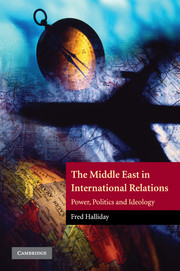Introduction: world politics, the Middle East and the complexities of area studies
Published online by Cambridge University Press: 05 September 2012
Summary
‘History’, said Stephen, ‘is a nightmare from which I am trying to escape.’
James Joyce, UlyssesThe end of the twentieth century and the onset of the twenty-first have not been kind to students of International Relations, let alone to those of the Middle East. For decades prior to the 1990s it was the claim of political scientists, and of their separate but cognate colleagues in International Relations, that they could, within some broad framework of modernisation – capitalist, socialist or other ‘third’ way – and of a changing world system, i.e. what has now, since the early 1990s, been termed ‘globalisation’, analyse and to some degree anticipate the development of societies.
History had, however, not lost the knack of surprising and in the last decades of the twentieth century was to demonstrate that its cunning, famously noted by Hegel, was far from dead. The Tunisian sociologist Professor Freij Stambouli once explained to me, as he was driving with characteristic ebullience around his home town of Monastir, then the residence of the former President Habib Bouguiba, that three events in recent times had discredited the claims to knowledge of social science with regard to the Middle East and more generally: the outbreak of the Lebanese civil war in 1975, in a society hitherto noted for being the most tolerant and prosperous in the region; the Iranian revolution and the fall of the Shah in 1978–9, a political rather than armed revolt which toppled a regime that had immense political and economic power, an army of 400,000 men, the latest western military equipment, and the unanimous backing of Washington, London, Paris, Moscow and Beijing alike; and in 1989–91 the fall of the Berlin Wall and the collapse of Soviet communism and its east European empire, an event that few, except some lucky eccentrics, had ever anticipated, and which brought to an end the last of the four great conflicts – European colonial rivalry (1798–1914), World Wars I (1914–18) and II (1939–45) and then the Cold War (1946–91) – that had marked world politics, and the Middle East, in the previous two centuries.
- Type
- Chapter
- Information
- The Middle East in International RelationsPower, Politics and Ideology, pp. 1 - 18Publisher: Cambridge University PressPrint publication year: 2005

